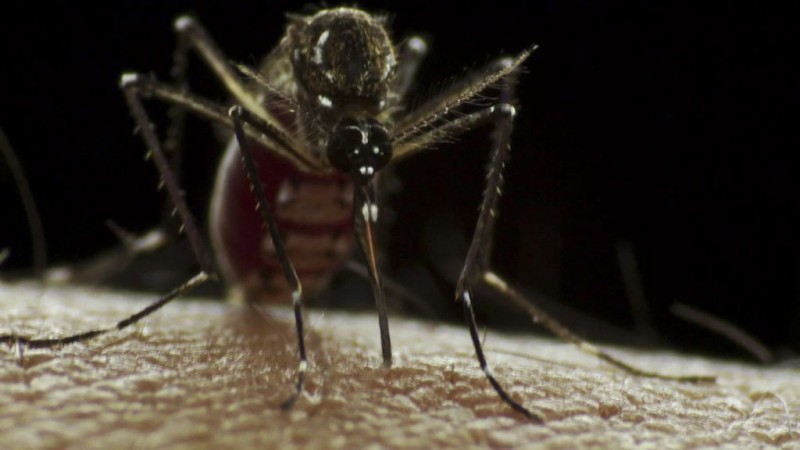
The Aedes aegypti mosquito in macrophotography.
Copyright Sanofi Pasteur – May 2011, used under a CC BY-NC-ND 2.0 license.
As cases of the dreaded Chikungunya virus increase throughout the Caribbean, Jamaica continues to grapple with containing the spread of the disease across the island.
The virus, which causes high fever and severe joint pain, is spread by the Aedes Aegypti mosquito. Thus far, the government's approach has been to ask citizens to be vigilant about ensuring that their surroundings are not conducive for mosquitoes to breed and educating them about prevention methods. It also plans to declare a national cleanup day, as the unreliable collection of garbage in some areas has been exacerbating the situation.
With cases of the virus expected to increase, however, many have been critical about the lack of available medicine to help combat the symptoms, the untimely emergency response and the fact that the ministry has not been as forthcoming as it ought to be about the outbreak.
At the beginning of this week, Carolyn Joy Cooper at Jamaica Woman Tongue criticised the country's minister of health for understating the number of Chikungunya cases, calling the whole thing “a word game”:
As late as last Monday, Dr Fenton Ferguson was still claiming that there were only 35 ‘confirmed’ cases of chik-V in all of Jamaica. If the goodly dentist has a public-health inspector to spare, I can prove that a full 25 per cent of these cases are concentrated in just two roads in my neighbourhood!
I have chik-V. My neighbours to my right and left and up the road are also afflicted. That’s four of us. And down the adjacent road, there are at least another five cases. So that makes nine out of 35. And that’s just the ones I know about. Of course, the big trick is ‘confirmed’. We are not ‘confirmed’ cases. We have the symptoms, but that doesn’t matter.
As far as the Ministry of Health is concerned, if you haven’t done a blood test, you and your doctor are just guessing.
To take the guess work out of it, Cooper decided to go for a blood test, but was told that “there were no reagents in stock”. She wondered why, when so many blood tests were being done for Chikungunya that labs had actually run out of reagents, the health ministry was still insisting that there were only “35 confirmed cases”. The answer seemed to lie in Jamaica's tourism industry:
I completely understand Dr Ferguson’s anxiety about scaring off visitors with chik-V. After all, tourism is our bread and butter. But I think he’s underestimating the bravery of potential tourists. […]
The minister of health needs to be far less concerned about tourists and much more worried about the people of Jamaica.
Blogger Jean Lowrie-Chin agreed, noting that “an insular ‘broadcast to the nation’ was not an appropriate vehicle to communicate the chikungunya crisis now touching almost every household in Jamaica,” referring to Dr. Fenton Ferguson's televised address to the nation on September 28. He has since admitted that there was a discrepancy between the number of confirmed and suspected cases of the disease, but maintains that the health ministry acted professionally.
Lowrie-Chin placed much of the blame for the spread of the disease on the shoulders of “careless Jamaicans who continue to show little pride in their environment” but also suggested that the government undertake an employment programme, similar to what was introduced in Cuba, whereby people would be trained to identify and destroy mosquito breeding sites and educate at-risk communities. Her post listed a number of ways in which official communication about the Chikungunya outbreak could have been better handled, saying:
What makes simple, logical steps so difficult, is bureaucracy – that morass which is the perfect hiding place for mediocrity and incompetence. While we must respect our democratically elected government, they should in turn respect the people they swore to serve.
She maintained that many of the missteps with “this ChikV issue” are a result of “gaps in governance” and the culture of mediocrity that creates a brain drain, chasing some of the most innovative minds to countries where their ideas would be valued.
Jamaica, like other economically challenged regional territories, has been losing much of its human capital for decades. Research conducted by the World Bank found that “over 360 percent” of Jamaicans with a tertiary level education migrate, usually to the United States, because of its close proximity:
The very high migration rate of the best educated from Jamaica means that the number of migrants with a tertiary education from this country actually exceeds the number of local residents with this level of education.
According to netizens, if the Jamaican government's response to this health crisis is any indicator, it has been business as usual, with nary an inventive approach in sight:
This agonizing ChikV is a metaphor for the pain and suffering that is being felt by humble Jamaicans, barely surviving on the margins of poverty. They deserve some hope that our leaders will do right by them, bringing our nation to a healthy state.
Realising that the health ministry is not sufficiently rising to the Chikungunya challenge, blogger “Cucumber Juice” posted an in-depth Q&A about the disease, prevention methods and ways in which to manage the symptoms if you do contract Chik-V.







6 comments
Trinidad ain’t too far behind. 8 out of 9 of my family members at home have gotten it already..! And a good few friends..
Another inhibiting factor to preventing the spread of the Chik-V is that many Jamaicans do not believe the information from the government that it is spread by mosquitoes, some believe it is contagious and spreads by touch or is airborne, so those persons are less likely to care about destroying breeding sites .